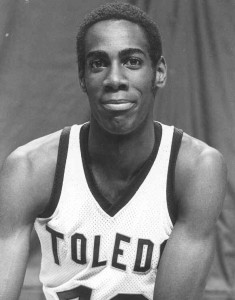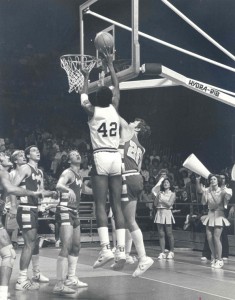Diverse Alumnus
By Patty Gelb
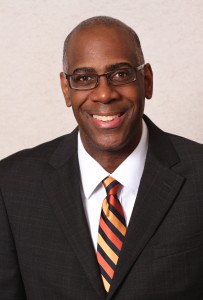 Dr. Leon McDougle’s (B.A. in Biology ’85) path has rocketed over the years. He started as a young man who grew up in Sandusky, Ohio, with a dream of becoming a doctor, through an undergraduate degree at The University of Toledo. It continued with him earning a master of public health degree from the University of Michigan and a doctorate of medicine from U of M’s rival “Down South,” The Ohio State University. His most recent accomplishment includes a new appointment as The Ohio State University Wexner Medical Center’s first chief diversity officer (CDO).
Dr. Leon McDougle’s (B.A. in Biology ’85) path has rocketed over the years. He started as a young man who grew up in Sandusky, Ohio, with a dream of becoming a doctor, through an undergraduate degree at The University of Toledo. It continued with him earning a master of public health degree from the University of Michigan and a doctorate of medicine from U of M’s rival “Down South,” The Ohio State University. His most recent accomplishment includes a new appointment as The Ohio State University Wexner Medical Center’s first chief diversity officer (CDO).
His new role at Wexner Medical Center became effective July 1, pending OSU Board of Trustees’ approval. This appointment is in addition to McDougle’s current role as associate dean for diversity and inclusion at the OSU College of Medicine. McDougle sees diversity as being central to the medical center’s mission and serves as a driver of institutional excellence and innovation to advance health equity.
McDougle’s interest in becoming a family physician stemmed from his upbringing in Sandusky and hearing stories about Dr. Waudell William Hunter who was an African American physician in that city with an “outstanding reputation for being an excellent physician that served all,” McDougle said. His role model was even known to accept farm produce for payment while caring for anyone who needed his services.
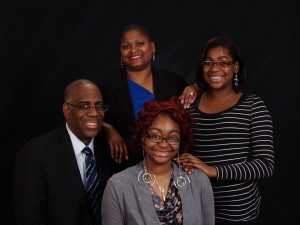 “He was a very well-respected physician and stories about him while growing up planted the seed that made me want to be a physician,” McDougle said. In future years, McDougle was touched to learn that Hunter also received his doctorate of medicine from OSU in 1934. While attending an alumni dinner in 1989 which included décor of historic photos of OSU medical classes, he saw a picture of Hunter as a student.
“He was a very well-respected physician and stories about him while growing up planted the seed that made me want to be a physician,” McDougle said. In future years, McDougle was touched to learn that Hunter also received his doctorate of medicine from OSU in 1934. While attending an alumni dinner in 1989 which included décor of historic photos of OSU medical classes, he saw a picture of Hunter as a student.
McDougle also credits much of where he is today to his youth and having two parents who stressed education. He feels his upbringing was important because of Sandusky’s excellent school system. At that time, the city had a history of never failing to pass a school levy.
“We had great instructors,” McDougle said. “We had great diversity in our school system including (the late) principal Desmond Fernandez who also helped my father improve his reading skills during evening education classes. We also had African American male and female instructors like Bobby Langdon, Emmanuel Irby and Wilma Stacey. That was formative and very helpful.”
McDougle’s parents were going through a divorce during the time he was deciding on colleges. He had received appointments to attend the U.S. Naval Academy or West Point. But, he decided not to attend either because they were too far away from home and, as the eldest of five siblings, he felt he needed to be accessible during this unfavorable time for his family. He also received the advice of his neighbor, Percy Watson, who recommended that he consider UT which had an excellent pre-medical program and basketball team, a sport which he played in high school. With bags in hand, he moved to Toledo.
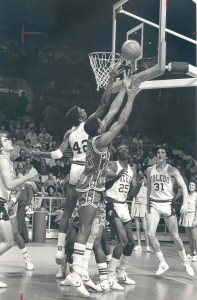 McDougle knew what he wanted as a career and his advisor, James Stebbins, really encouraged him to pursue his goal of becoming a physician.
McDougle knew what he wanted as a career and his advisor, James Stebbins, really encouraged him to pursue his goal of becoming a physician.
“It really speaks to the importance of having great advisors like Mr. Stebbins and Dr. Lancelot Thompson, which I had at UT,” McDougle said. “I think the role of advisors at the undergraduate level is very important, especially in providing substantive and important advice as it pertains to the health professions.
“I learned a great deal in regard to working with others. Seeing viewpoints of people from different racial and ethnic backgrounds really helped prepare me for the work that I do today.”
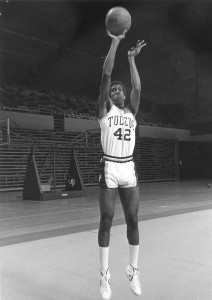
If his name sounds familiar to followers of UT’s basketball program, it should. Dr. Leon McDougle was first known as Leon McDougle, No. 42 for the men’s team. Upon arriving to campus, he knew he could be competitive in terms of his basketball abilities and potentially receive scholarship money to help pay for college if he were to try out for the team. So that’s what he did.
Not only did he make the squad, he played for three years, including lettering for one season. “My experience on the basketball team informed my consciousness to the importance of providing opportunities for people to succeed,” McDougle said.
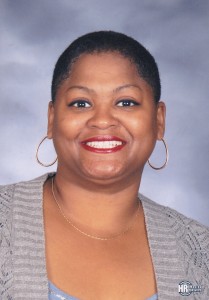 While making many lifelong friends, McDougle also met his future wife, Natasha Jones-McDougle (B.A. in Communication ‘86 and MEd ‘90), at UT. She was a freshman and he was a sophomore, both in a communications class together. But their relationship did not become serious until she was in graduate school and he entered medical school. They were married in Cincinnati in 1992 and are the proud parents of two daughters, Peri and Autumn.
While making many lifelong friends, McDougle also met his future wife, Natasha Jones-McDougle (B.A. in Communication ‘86 and MEd ‘90), at UT. She was a freshman and he was a sophomore, both in a communications class together. But their relationship did not become serious until she was in graduate school and he entered medical school. They were married in Cincinnati in 1992 and are the proud parents of two daughters, Peri and Autumn.
After receiving his medical degree, McDougle completed a family medicine residency at the Naval Hospital at Camp Pendleton, Calif. A member of the OSU faculty and medical staff since 2001, he is a tenured associate professor of family medicine and the director of the medical pathways premedical post-baccalaureate program in the College of Medicine. Even as the chief diversity officer and with all his other responsibilities, he plans to continue to see patients in the department of family medicine. At OSU, McDougle is known as a leader in studying the delivery of culturally competent primary and preventative care for underserved, uninsured and underinsured populations. He helped OSU garner a five-year, $3.8 million grant to establish a new educational track to train internal medicine residents to meet the medical needs of the underserved. He was also the principal investigator for a major physical fitness program for African Americans with Type 2 diabetes.
McDougle is a fellow of the American Academy of Family Physicians and was promoted to commander of the Naval Reserve Medical Corps in 2000. He is a member of many professional organizations, including the National Association of Advisors for the Health Professions, National Postbaccalaureate Collaborative, Association of American Medical Colleges (AAMC) Group on Diversity and Inclusion, and the Network of Minority Research Investigators.
Recognized with Ohio State’s 2012 Distinguished Diversity Enhancement Award, in 2011 he received the Distinguished Faculty Service Award for Dedication and Service to African Males at OSU from the Todd Anthony Bell Resource Center for the African American Male.


